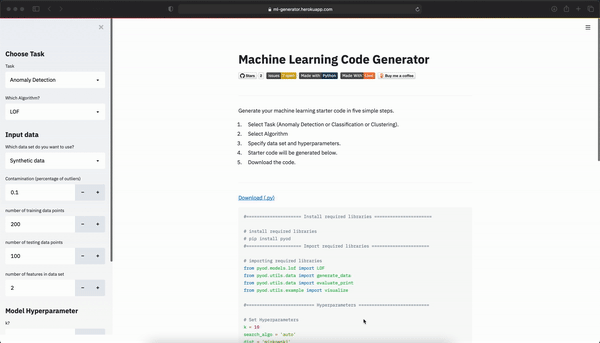A web-app to generate code for different machine learning task.
It is developed in my free time while learning and main motivation is to help machine learning beginers with starter code.
Try out MLGenerator : https://ml-generator.herokuapp.com
MLGenerator is simple web based machine learning starter code generator, build using streamlit. You can build custom starter code for different machine learning algorithms/tasks such as Regression, Classification, Clustering and Anomaly(Outlier) detection. MLGenerator uses different widely used Python libraries for different task such as Scikit-Learn, PyOD etc.
MLgenerator is inspired by traingenerator
- Classification
- Linear Regression
- k-Nearest Neighbors (k-NN)
- Decision Trees
- Random Forest
- Support Vector Machine
- Naive Bayes
- Clustering
- K-means
- DBSCAN
- OPTICS
- BIRCH
- Anomaly Detection
- LOF
- iForest
- kNN
- Dimensionality Reduction
- PCA
- t-SNE
To run MLgenerator in your local system, you have to install MLgenerator first.
git clone https://github.com/durgeshsamariya/MLgenerator.git
cd MLgenerator
pip install -r requirements.txt
streamlit run app/main.py
If you want to add template in MLgenerator, you can do it by following steps.
- Add sidebar method in
./app/sidebars/{Desired Task}.py. This function should contains a{Algorithm_Name}_sidebar()method. - Update
./app/main.pyfile with appropriate sidebar imports and call method. - Create folder in
./templates/{Desired Task}/. The folder should be algorithm name. - Create code template
code-template.py.jinjain./templates/{Desired Task}/{Algorithm Name}.
